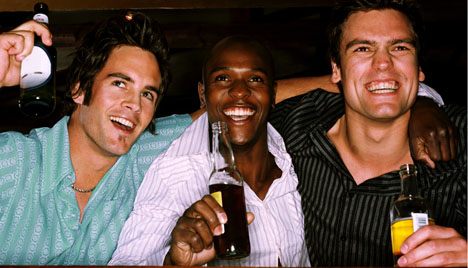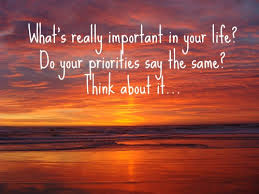
A while ago I was out with a buddy, and while we were eating he looked at me and asked “do you ever miss being single?”
That’s a pretty loaded question, so I had to get a bit of clarification on what he meant. He wasn’t talking about dating, or looking for other women. He was talking about simply being able to do what we were doing – being able to go out and grab some food with a buddy. To not have to worry about kids, or when he needs to be home, or feeling guilty about leaving his wife alone with the kids while he goes takes time for himself.
Looking at it that way, do I miss being single?
Truthfully?
Of course I do. But maybe it’s better to say that I miss certain aspects of it.
The Traditional Path
Growing up many of us follow “the template“:
- Finish high school
- Get a post-secondary education
- Start a career
- Date, with the hopes of finding that someone you want to build a life with
- Get married
- Raise a family
We follow the template because we see it. It’s been modeled to us our whole lives – from parents, grandparents, friends, the media, etc. And although people may not say it explicitly, at least at a subconscious level we are taught that this is “the best way”, or “the right way” to live.
Is it TRULY the best way to live?
Personally I like the template, but divorce rates (that continue to hover around 50% for first marriages) would seem indicate that it’s not necessarily an easy way to live.
So best? Who knows.
At the very least, I can say it’s not the only way to live.
Different “Ways” To Live
There are other ways to life your life.
Some choose to remain single (with no relationship).
For people who do, I suppose you can question if they actually want to be single or if they have just resigned themselves to it.
I suspect it’s probably a mix of both. Really, for the people who are married I wonder how many actually want to be married and how many are simply scared to be alone. In any case, remaining single is a viable choice, and is the one that provides the greatest amount of personal freedom.
You may never actually be able to do whatever you want, but your choices impact less people when it’s just you.
Others may stay single yet date casually. I guess this is way of trying to have some of the benefits of a relationship without the expectations commitment brings.
Then you have others who are in exclusive relationships, but have no interest in marriage or even living together. I know a guy who’s been with his girlfriend for a few years now. Both are divorced, have their own kids, and love each other. But they still value living independently, and their relationship is mainly characterized by getting together a few nights a week and vacationing together periodically.
According to him this approach helps reduce the effects of taking each other for granted (hedonic adaptation), because they only see each other when they want to.
Personally I don’t get it, but hey, it seems to work for them.
For each of these approaches you can also add a variation – with kids and without. If you’re raising a family together, I would think that probably works best for all involved if you are living under one roof. But kids bring with them a whole other set of challenges.
Really, the life of a married couple with no kids generally looks VERY different from the life of a married couple with kids. And even comparing couples with kids, the number of kids and their ages can have big impacts on what the couple’s lives look like.
Choosing a Path
So what approach is best? To stay single (and not date)? Date casually? Get married? Have kids? Not have kids?
There’s no right or wrong answer here.
- If you stay single you have the greatest control over your own life. And although you may not have a “partner”, you probably have friends, family, coworkers, etc to provide much of the connection that people often look for in a relationship.
- If you date casually, your relationship life is probably more “exciting” (speculating here, as I really wouldn’t know). The early phase of a relationship is often referred to as the discovery phase, or the passion phase. It’s a phase that can’t last though, so having a number of new relationships ensures you are always having new experiences.
- If you are in a long term committed relationship where you are living with that person/married, you will have a partner in life, and someone to share experiences and “grow old” with.
- If you have children, you have the experience of truly developing and shaping another life to be the best it can be. And there is a certain level of pride and joy in being a parent that is difficult to articulate, and can only be understood by someone who is a parent.
Each approach to life is different. They each have a number of strengths; but there are also a number of challenges and struggles inherent to each approach.
There is no perfect approach that can give you the good without the bad. Being a parent has some incredible and rewarding moments. But man, it also involves a lot of sacrifice and challenges. Getting married and having a partner in life can be great, but it can also be very difficult.
Each choice involves making some sort of sacrifice, and giving up something else. It’s part of the trade off.
Grass is Greener Syndrome
Where we get ourselves in trouble is when we start comparing, or looking at “the road not chosen”.
When times are good, we don’t even think about our choices (which sadly means we actually taking them for granted and not appreciating the good in them).
When times get hard though? Well, during those times the sacrifices and challenges or our chosen road often stand out. And it’s easy to start to question if it’s worth it.
Imagine you have chosen one road, and you find yourself talking to someone who has chosen another. It’s really easy to look at their life and see primarily the good parts. The freedoms they have that are different from yours, the sacrifices you make that they don’t seem to have to make.
Remember though – two people can go out who have chosen different roads, and talk. And each can head home envious of the others life.
The grass isn’t really greener on the other side. It’s just a bit different. With both strengths and weaknesses – just like the life we have now.
Going back to the start, do I miss being single? Sure, sometimes. I would be lying if I said otherwise. I also sometimes miss the freedom from my life before I was a parent.
Hell, I miss the days I lived at my parents – where I had no job (beyond my paper route), no responsibilities or bills, and not a care in the world. Did I appreciate that life at the time? Of course not – because that life was just what I knew.
And that’s the sad part.
Often you don’t appreciate the things you have until they are gone. We shouldn’t HAVE to lose things before we can appreciate them. We should be able to take time out every day, and be truly grateful for the things we DO have.
If we could do that, maybe the bad times wouldn’t feel so overwhelming. Maybe we wouldn’t get to the point where we are looking longingly at the road not taken.
So instead of looking at what we don’t have and what we are missing, perhaps we should be trying to remember and appreciate the strengths of the road we have chosen. And focusing on making it the best life it can be.







